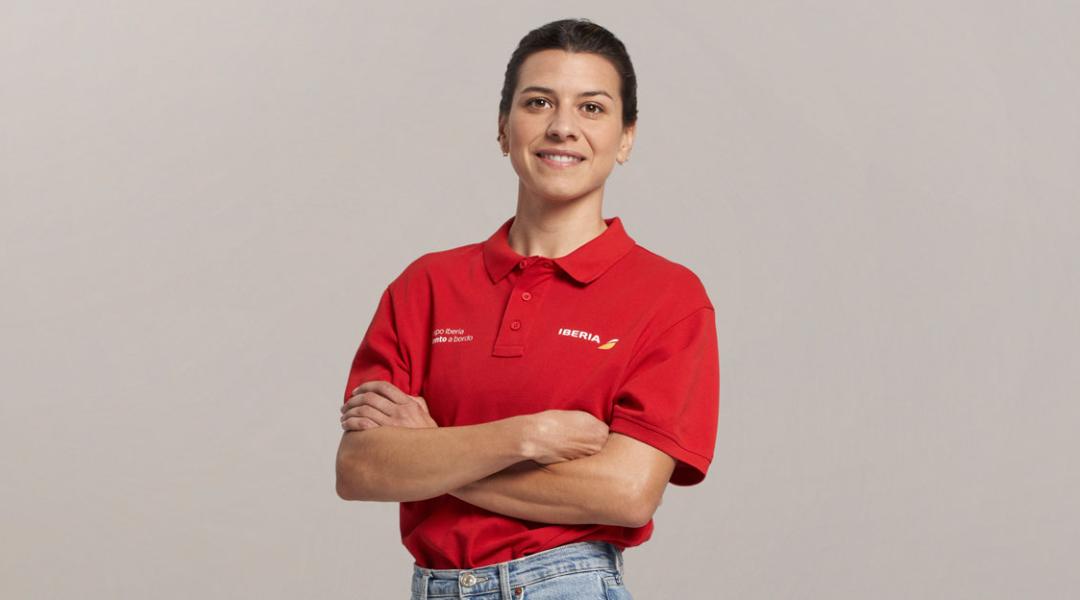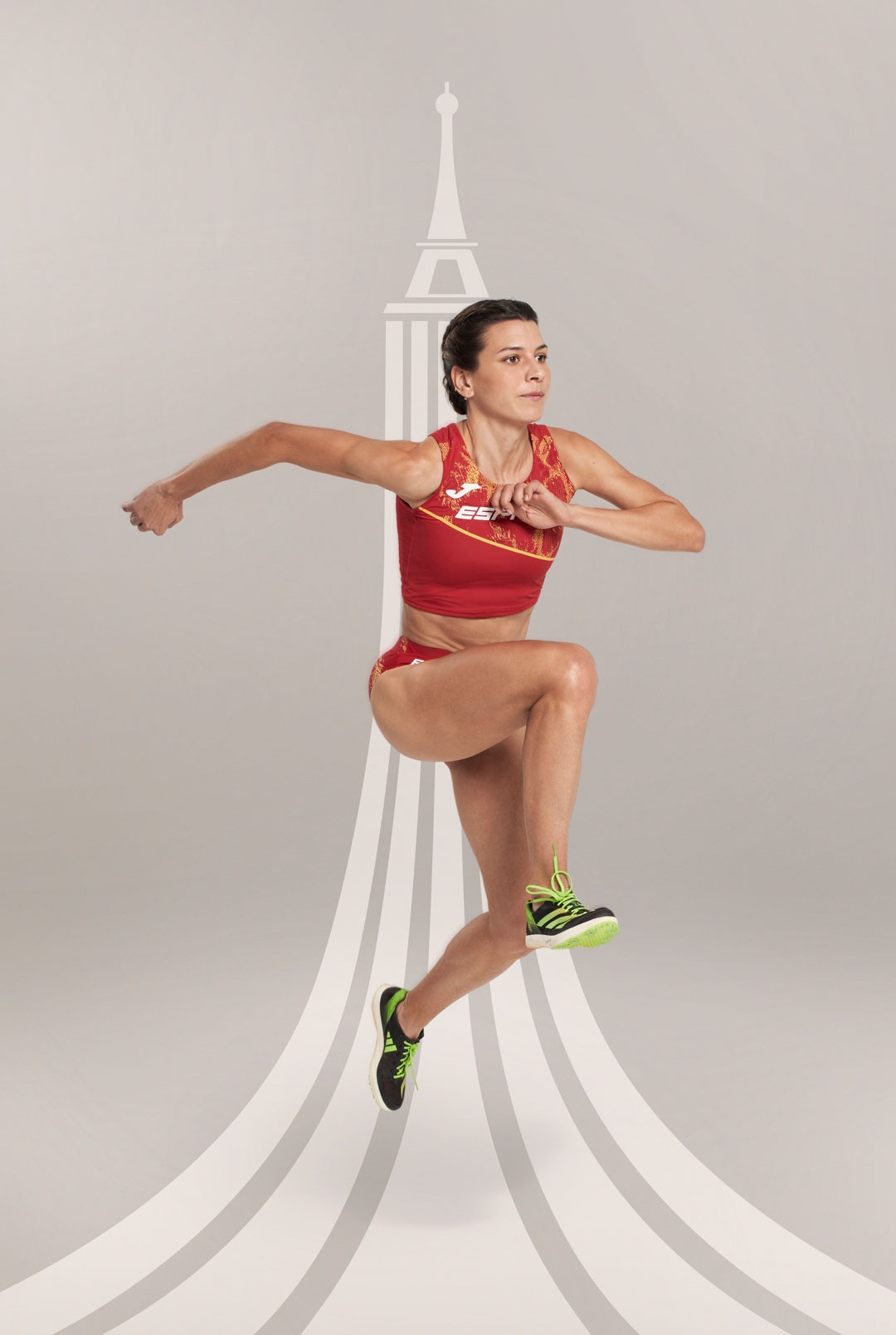Irene Sánchez-Escribano
Slow and steady

Just a few days before the Tokyo Games, Irene Sánchez-Escribano felt her left foot crack. Tests confirmed the worse-case scenario: a broken second metatarsal bone. A severe blow. After shedding a few tears, this athlete overcame her greatest challenge yet: she returned to competing and achieved her personal best. This summer, she’s working slow and steady towards the entry standard that will open the doors to Paris.
“While training one afternoon, I felt like I’d stepped on a twig, my foot cracked. An X-ray the following day confirmed that it was broken.” This is how Irene Sánchez-Escribano (Toledo, 1992) remembers one of the toughest moments in her life, the injury that kept her from competing at the Games in Tokyo. She snapped because although athletes seem indestructible, they’re also vulnerable. To overcome this setback, she received psychological support, something she’s worked on since 2018 and which has helped her a lot, she admits. After leaving her injury behind, she’s back with a bang: she achieved her personal best (9:23:94) at the World Athletics Championship last year in Eugene (Oregon, United States). Now, she’s preparing for the summer season with several goals in mind: regaining the crown for 3000-metre steeplechase at the Spanish Championship, taking part in the World Championship in Budapest and achieving the entry standard that will allow her to qualify for the Paris Games and get rid of the thorn in her side.
Let’s go back to the start. Tell me where your passion for athletics comes from.
My PE teacher was José Luis Carbonell, a big fan of athletics. I’d tried tennis but wasn’t a fan, so he suggested signing up to an athletics club he was setting up. It was 2001 and I was nine years old. I started competing and I was good at it. I also coincided with a group of girls that I got on with —in fact, my best friend is one of them— and that’s how I slowly got into it.
Your speciality is the 3000 m steeplechase. How did you come to it? I ask because it probably wasn’t your first choice.
It was in 2014, quite late for me because I was 22. When I came to Madrid to study at the age of 18, I changed coach [Antonio Serrano] and at the beginning, I mostly did 1,500 m, but I plateaued and started to lose motivation. At that time, Antonio suggested: Why don’t we prepare for the 3,000 steeplechase? I didn’t even want to hear about it because I’d never jumped over a hurdle in my life, but in the end, I agreed to try. The first year I prepared for it, I came second in the U-23 Spanish Championship and the following year I won the Spanish Championship.
“I didn’t even want to hear about the 3000 m steeplechase because I’d never jumped over a hurdle in my life, but in the end, I agreed to try”
In athletics, you always have to keep your eye on the time; what’s it like to feel the pressure of the stopwatch?
When you go to a sports event to achieve a particular time for whichever championship (European, World or Games), you race against the chronometer. It’s not that I feel pressure, but I do go out there super focused on giving the best version of myself. In the end, training is the most important thing; if you’ve trained well during prior months, expecting to make good time is logical.

Irene Sánchez-Escribano overcame her most difficult obstacle and now she is focused on Paris.
We’ve idealised athletes: people who are really self-assured and strong physically and mentally. Is this true?
Yes, this is the idea people have of athletes but, at the end of the day, we’re still people and there’s all sorts. In my case, I think I’ve grown in that sense because when I started to stand out in the absolute category, I wasn’t sure if it was because I’d improved a lot or because my rivals weren’t as strong anymore. I doubted myself. In 2018, I started working on the psychological side and it made me realise that results were thanks to working hard daily. Now that I’ve been doing this for longer, I trust myself and my years of experience. Obviously, I go through rough patches, but the psychological work I’ve done has helped me immensely. Some people also think I need to believe in myself more (laughs).
An injury kept you from the Tokyo Games. Although you’re used to overcoming obstacles, was it the toughest you’ve had to face?
It was really hard. In 2021, I was in really good shape and had won the Spanish Championship, but while training one afternoon, I felt like I’d stepped on a twig, my foot cracked. An X-ray the following day confirmed that it was broken. I was in quite a lot of pain and couldn’t even put my foot on the ground, and I thought: How am I going to go to the Games in ten days? At the time, I cried a lot... I asked myself: Why me? Why now? I’d been training for five years, and I was meant to be there. After a few days I managed to calm down and accept that injuries are part of the process.
“Now I trust myself and my years of experience. I go through rough patches, but the psychological work I’ve done has helped me”
I guess you really want to get rid of the thorn in your side in Paris?
Yes, now every time someone talks to me about Paris, I touch wood. After recovering from my injury, I quickly set my sights on getting back in good enough shape to be able to compete internationally and, obviously, be at the Games in Paris. Luckily, this cycle lasts only three years.
We’ve spoken about your worst moment. To make up for it, tell us your favourite memory related to athletics.
My first absolute Spanish Championship in 2015. It was really emotional because winning the national championship is highly valued within athletics. The race was wide open because the level was on par and I had chances, but I never thought that I would win. It was unexpected and a turning point for me, because I was in my 5th year of Medicine at the time, and I wasn’t sure if I was going to commit 100% to athletics or focus on my professional career. Thanks to that result, I gave athletics my all and live the life I do today, so it was a determining factor.
Last year you achieved your personal best for 3000 m steeplechase. Does this mean you’ll be around for a while?
This is my goal when I train every day, to continue improving. I think I took a leap in 2019 by going down to 9:30, but the following years were tough because of the pandemic and my injury. I think I achieved a really high level, but I was unable to prove it. Last year was tough psychologically because I was afraid that another injury would stop me in my tracks. I struggled to get my confidence back and was short-tempered, people would tell me, but when I qualified for the World Championship again, I enjoyed myself again. And making that time spurred me on, it dispelled my fears.
“Talent is a skill you have and work on improving. It requires care, attention and refinement”
Coming back to the present, which are your goals for the rest of 2023?
My main goal is making the World Championship final in Budapest. Also, it’s more feasible to achieve the entry standard for the Paris Games there, so that’d be great. It would allow me to plan the next season differently. I’d also like to win the Spanish Championship again because I didn’t make it last year.
Let’s talk about talent. What does it mean to you?
Talent is a skill or ability you have and work on improving. It requires care, attention and refinement to really turn into talent. A lot of hard work goes into it.
And speaking of talent, what do you, an experienced athlete, think of the future of Spanish female medium- and long-distance running?
I think that the girls who have made the leap from U-23 to the absolute category in recent years have raised the bar of long-distance running in Spain and I’m really glad because, in the past, I’ve felt quite lonely at some competitions. They’re making quite an impression! And that’s good because it keeps you from getting too comfortable. Cristina Ruiz, Isa Barreiro or Paula Herrero for long-distance running, and for medium distance, Águeda Marqués for 1500 m or Marta Serrano for 3000 m steeplechase. And I could name many more.


